Lauded in the West as the man who helped bring down the Berlin Wall and end the Cold War without bloodshed, Mikhail Gorbachev was widely despised at home as the gravedigger of the communist Soviet Union, Reuters reports:
“My policy was open and sincere, a policy aimed at using democracy and not spilling blood,” he told Reuters in 2009. “But this cost me very dear, I can tell you that.”… He made several attempts to found a social democratic party, opened a think-tank, the Gorbachev Foundation, and co-founded the Novaya Gazeta newspaper, critical of the Kremlin to this day.
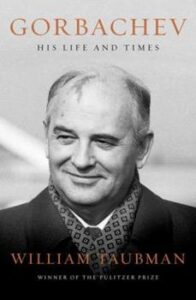 The obstacles to reform grew out of Russian history, notes William Taubman, a professor emeritus of political science at Amherst College and author of “Gorbachev: His Life and Times”: czarist authoritarianism morphing into Soviet totalitarianism, slavish obedience to authority occasionally punctuated by eruptions of bloody violence, hostility to compromise (a word with a negative connotation in Russian), no tradition of democratic self-organization, minimal experience with free markets, no real rule of law.
The obstacles to reform grew out of Russian history, notes William Taubman, a professor emeritus of political science at Amherst College and author of “Gorbachev: His Life and Times”: czarist authoritarianism morphing into Soviet totalitarianism, slavish obedience to authority occasionally punctuated by eruptions of bloody violence, hostility to compromise (a word with a negative connotation in Russian), no tradition of democratic self-organization, minimal experience with free markets, no real rule of law.
Gorbachev’s domestic critics complained that he “listened” and “changed his mind”—virtues in a democracy, he writes for The Wall Street Journal. Even Gorbachev himself became more pessimistic as he aged, observing in November 2003 that full democracy in Russia may take “decades,” perhaps “the whole twenty-first century,” to achieve.
Gorbachev and Mr. Reagan “gave us the gift of at least 30 years of life without the threat of a global nuclear war,” said Dmitri A. Muratov, the editor of Novaya Gazeta – founded by Gorbachev – and a winner of last year’s Nobel Peace Prize. “We have wasted this gift. The gift does not exist anymore.”
Not many people have it in their power to change the world as much as Mikhail Gorbachev did. Even if he didn’t start out wanting to do so, historian Anne Applebaum tweeted.
 He sometimes criticized Putin in public. But in truth, all of Gorbachev’s most significant decisions, his most radical actions, were the ones he did not make, she writes for The Atlantic. He did not order the East Germans to shoot at people crossing the Wall. He did not offer the Polish communists a bailout as their economy crashed. He did not launch a full-scale war to prevent the secession of the Baltic states, or to stop the Ukrainians from declaring independence, or to prevent Russia from electing its own leadership too.
He sometimes criticized Putin in public. But in truth, all of Gorbachev’s most significant decisions, his most radical actions, were the ones he did not make, she writes for The Atlantic. He did not order the East Germans to shoot at people crossing the Wall. He did not offer the Polish communists a bailout as their economy crashed. He did not launch a full-scale war to prevent the secession of the Baltic states, or to stop the Ukrainians from declaring independence, or to prevent Russia from electing its own leadership too.
Neither liberator nor liberal
In Ukraine, Mr. Putin is fighting in the shadows of the empire whose end Mr. Gorbachev presided over, having started a war that has killed thousands in the name of restoring Moscow’s dominance over what the Kremlin claims to be Russian lands, The Times reports. But Mr. Putin’s battle to reverse the legacy of Mr. Gorbachev ….extends beyond territorial control to the personal and political freedoms that the last Soviet president ushered in, and that the Kremlin is now fast reversing.
“All of Gorbachev’s reforms are now zero, in ashes, in smoke,” a friend of Mr. Gorbachev’s, the radio journalist Aleksei A. Venediktov, said in a July interview. “This was his life’s work.”
Gorbachev was neither liberator nor liberal to the Atlantic Council’s Daniel Fried, a former assistant secretary of state for Europe and Eurasia. But the consequences of what he set out to achieve, of the reforms he put in motion, made better things possible for Russia, for Ukraine, and for the peoples of the many “captive nations” who had a window to liberate themselves and took it.
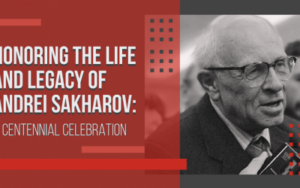 Very shortly before [Soviet dissident Andrei] Sakharov died in 1989, he called me in Israel to say that he could not visit as he had planned, since he would not permit himself to leave Moscow for even a single day and potentially miss an opportunity to block Gorbachev’s bid for unrivaled power, notes Natan Sharansky. Participating with Gorbachev at a conference in Poland, I was asked about the forces leading to the regime’s demise. In my response, I discussed three factors, he writes for The Washington Post:
Very shortly before [Soviet dissident Andrei] Sakharov died in 1989, he called me in Israel to say that he could not visit as he had planned, since he would not permit himself to leave Moscow for even a single day and potentially miss an opportunity to block Gorbachev’s bid for unrivaled power, notes Natan Sharansky. Participating with Gorbachev at a conference in Poland, I was asked about the forces leading to the regime’s demise. In my response, I discussed three factors, he writes for The Washington Post:
Sakharov and other dissidents who fought valiantly to keep the spark of freedom alive; Western politicians such as Sen. Henry “Scoop” Jackson (D-Wash.), President Ronald Reagan and British Prime Minister Margaret Thatcher, who had understood the nature of the regime and were ready to link relations with Moscow to the latter’s respect for human rights; and finally, Gorbachev, who perceived the direction of history and responded accordingly. Immediately after finishing my talk, I approached Gorbachev to thank him for releasing me. I was surprised to discover that he was almost offended by my remarks, saying, “I released you against all advice to the contrary, and you listed me in only the third place?”
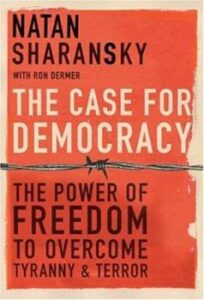 Yet if we look at the 20th century not through the lens of political struggles, but rather from the bird’s-eye perspective of history, we see how utterly unique Gorbachev was, Sharansky adds ……. a product of the Soviet regime, a member of its ruling elite who believed its ideology and enjoyed its privileges — yet decided to destroy it nevertheless. For that, the world can be grateful.
Yet if we look at the 20th century not through the lens of political struggles, but rather from the bird’s-eye perspective of history, we see how utterly unique Gorbachev was, Sharansky adds ……. a product of the Soviet regime, a member of its ruling elite who believed its ideology and enjoyed its privileges — yet decided to destroy it nevertheless. For that, the world can be grateful.
U.S. House Majority Leader Steny H. Hoyer (MD) “appreciated his government’s decision to allow the release of numerous dissidents who had been imprisoned or exiled for decades and allow open discussion about past Soviet atrocities [and] welcomed his permission for Soviet Jews to emigrate.”
 The Soviet Union’s economic malaise in the 1980s unleashed the ambitions both of Gorbachev and of the Communist-turned-Russian-patriot Boris Yeltsin, Vladislav M. Zubok’s Collapse: The Fall of the Soviet Union. The other side of Gorbachev’s defeat was Yeltsin’s anti-Soviet victory, notes Catholic University’s Michael Kimmage. American policymakers, according to Zubok, were too quick to dismiss Gorbachev’s desire for an undivided Europe. In general, the West’s recipes for economic shock therapy contributed to the illiberal, anti-Western mood that would enable Putin’s rise, he writes for American Purpose.
The Soviet Union’s economic malaise in the 1980s unleashed the ambitions both of Gorbachev and of the Communist-turned-Russian-patriot Boris Yeltsin, Vladislav M. Zubok’s Collapse: The Fall of the Soviet Union. The other side of Gorbachev’s defeat was Yeltsin’s anti-Soviet victory, notes Catholic University’s Michael Kimmage. American policymakers, according to Zubok, were too quick to dismiss Gorbachev’s desire for an undivided Europe. In general, the West’s recipes for economic shock therapy contributed to the illiberal, anti-Western mood that would enable Putin’s rise, he writes for American Purpose.
Gorbachev wanted to reform the increasingly sclerotic and bankrupt political system and failing economic trajectory through three unprecedented structural reforms, says GZERO’s Ian Bremmer (above):
- First glasnost, political openness. In other words, free speech.
- Secondly, perestroika, economic opening, capitalism
- Third, khozraschyot, self accounting, federalism. In other words, let people say what they want about the government. Let them make money as they can. And let local officials have more accountability for the decision making processes that are underneath them.
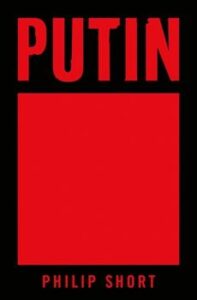
Putin cracked down on the freedoms that he had sought for his country, Newsweek adds.
“Putin is undoing pretty much every single thing Gorbachev stood for in the eyes of both the West and certainly the more enlightened Russians,” said Sergey Radchenko, a Cold War expert and professor at the Johns Hopkins School of Advanced International Studies.
“Russia today is resembling the Soviet Union in its worst years so there’s more and more repression and the shutting of Russia off from the West,” he told Newsweek, “All of those things Gorbachev worked hard to undo.”
“It’s a tragedy for Gorbachev to have survived so long to see so many of his accomplishments dismantled before his eyes,” he said, “I can just imagine that Gorbachev died a very disillusioned man.”
“It’s perhaps understandable that during the initial phase he [Putin] used certain authoritarian methods in his leadership, but using authoritarian methods as a policy for the future – that I think is wrong. I think that’s a mistake,” Gorbachev told the LBJ Library (below).
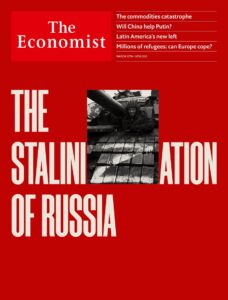 Gorbachev, who had opened up Soviet society after decades of repression, wrote explicitly of “costs” associated with Putin’s “authoritarian” actions for Time in 2017, POLITICO adds.
Gorbachev, who had opened up Soviet society after decades of repression, wrote explicitly of “costs” associated with Putin’s “authoritarian” actions for Time in 2017, POLITICO adds.
In an interview with RFE/RL in 2012, Gorbachev mildly rebuked Putin, echoing the gentle criticism he expressed over many years about the Russian leader and the way he tightened the screws during his tenure, rolling back some of the progress made toward democracy and human rights since Gorchachev’s era, RFE/RL adds.
“I would do everything not to be in his position,” he said. “During his first presidential term, I thought that Vladimir Vladimirovich would — at all necessary costs — do a lot of positive things to stabilize the country. He did do a lot. He had a chance for thorough work on the advancement of Russia towards democracy. In my opinion, he did not succeed.”
“And now I doubt whether he set himself such a task,” he said.
China’s state-run outlet Global Times, however, cited online reaction among Chinese citizens and academics and wrote that “in a historical reflection, Gorbachev is naive and immature,” adding that he would be remembered as “a tragic figure who catered to the US and the West without principle,” The Post reports. Former secretary of state Condoleezza Rice, an expert on the Soviet Union and Russia, said on Twitter that Gorbachev’s life was “consequential because, without him and his courage, it would not have been possible to end the Cold War peacefully.”
“Hard to think of a single person who altered the course of history more in a positive direction” than Gorbachev, said Michael McFaul, a political analyst and former U.S. ambassador in Moscow, on Twitter.
 One of the greatest myths about U.S. democracy efforts is that a Washington officials carefully choreograph the efforts of groups like the National Endowment for Democracy (NED) or Freedom House, Stanford University’s McFaul once observed.
One of the greatest myths about U.S. democracy efforts is that a Washington officials carefully choreograph the efforts of groups like the National Endowment for Democracy (NED) or Freedom House, Stanford University’s McFaul once observed.
While they are perhaps supportive philosophically, policymakers at the White House and the State Department have had almost nothing to do with the design or implementation of American democracy assistance programs, he wrote for the Carnegie Endowment. In some countries, they clash with one another. I witnessed this as the National Democratic Institute’s representative in Moscow during the last days of the Soviet Union: “They” — the U.S. policymakers — supported Mikhail Gorbachev; “we” worked with Democratic Russia, Gorbachev’s opponents. The same divide is present in many countries today.
Communism and Soviet-type totalitarianism eventually disappeared from the region in a sweeping earthquake initiated by Gorbachev’s glasnost and perestroika: but the almost messianic visions shared at the time almost universally have not been fulfilled as hoped, Shlomo Avineri observed in a NED symposium.







